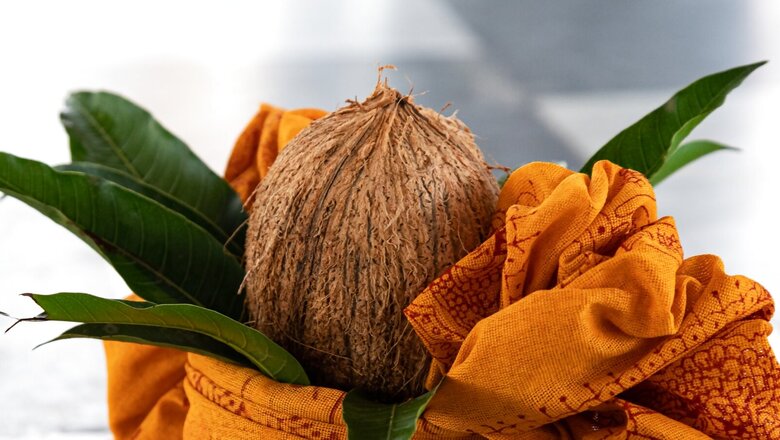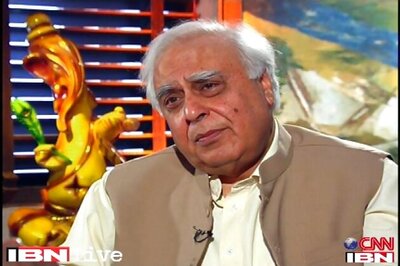
views
‘Dismantling Global Hindutva’ was an ostensibly stupendous effort by its organizers to create a disdain for Hinduism but the ineluctable propaganda invited reproval. In a nutshell, it was an attempt to create misinterpretations, misrepresentations, and malevolent use of false facts to stigmatize Hinduism. For an unsuspecting mass, this choice of self-coined notions can instill a vile outlook for a civilization that has cherished the human potential beyond the realms of any segregations, be it nations or religions. Thus, it becomes imperative to set the record straight and empower the global community to view the situation in toto, in order to have a realistic understanding of the entire landscape.
We all remember the case of the 22-year-old Indian student Rashmi Samant—the incident that raised more questions than we could discuss within the stretch of a conversation on ‘The Global Hinduphobia’. She was the first women to become the president of Oxford University Students’ Union (OUSU) from an Indian, Hindu ethnic background, but she was forced to resign a bit too soon. There are a lot of plausible explanations revolving around the forced resignation, with one of them being her old tweets which were termed ‘racist’ and ‘insensitive’, as ironical as it may sound, and were believed to have drawn flak. However, the young woman attributed “Hinduphobia” as the reason behind her stepping down just five days after being elected to the post on February 11, 2021. This has been, of course, denied by Oxford societies, but this isn’t an isolated case.
When we look at the series of events across the globe, there is a blatant blanketing exercise engulfing such incidents. Shubh Patel, a 12-year-old Hindu-origin boy, was denied playing soccer in Australia because he refused to remove his ‘Tulsi Mala’. It wasn’t the first time he was wearing the ‘Mala’ during the game, but this didn’t bar the referee from ousting the toddler. Canada is recently witnessing a similar trend against the Indian Hindu diaspora, with the incident of two teens abusing and pelting stones at a middle-aged Hindu man in Streetsville Park, Mississauga City, making it to international news lately. The 44-year-old man was performing a religious ceremony with his family on the evening of September 11 when the miscreants forced them to leave while assaulting the man, his wife, and two kids. Pratima Roy, the now-famous NASA intern, earned the wrath of a huge section of netizens because she posted a photo of her desk with ‘Hindu deities’.
ALSO READ | How States Have Denied Hindus Real Freedom with Centre’s Support for Last 70 Years
While one cannot simply deny the fact that these incidents have Hinduphobia at its core, and it’s a dire reality that needs to be accepted with a sense of maturity, one also has to undo what has smeared and vilified global minds against ‘Hindutva’. One needs to ruminate upon the factors that instill ‘hate’ in such turn of events. If we dig deeper, this distasteful course of hate crimes has its roots in apathy. Apathy towards understanding a concept fully before coming to a serious conclusion where an entire faith is denied its right to exist, the only faith and way of living that believes in coexistence rather than conflict! Well, let us put it this way: ‘Dismantling Global Hindutva’, is one such ‘failed, despicable, desperate and diabolical’ attempt to torment Hindutva.
Hindutva is being defined as a political movement advocating Hindu nationalism and the establishment of a Hindu state or an ideology or movement seeking to establish the hegemony of Hindus and Hinduism in India, so to speak. That is with a western prism and view point, of course. In actuality, ‘Tatva’ refers to “the essence of a principle”, while “ism” stands for a closed book of thought or a set of dogmas or blind belief system. Therefore, Hindutva is not a religion, but a way of life.
It connotes the indigenous philosophy, spirituality and the belief system of India, that is Bharat. Hindutva also doesn’t lead to God! It doesn’t give primacy to any particular scripture or a path. A Hindu is free to question, accept or reject the authority of even the Vedas like Jains, but still be a proud Hindu. Hindutva is all-inclusive and imbibed with tolerance, freedom of thought, choice and expression. It is not an ‘Only-ist’ belief system or faith, but a philosophy that endorses ‘Also-ism’. With utmost confidence, one can assert that no faith or ideology that denies or curtails one’s individual freedom or rights can be a part of Hindutva. To quote J. Nandakumar, an eminent scholar and author, “The only dogma that Hindutva admits is the one that doesn’t permit a dogma.”
Even an author of the calibre of Tom Holland claimed that Hindus had no idea that they belonged to something called “Hinduism” until the West enlightened them of the same. That was ‘pun intended’ on some serious note! This ‘we invented everything’ is the narrative to be blamed for intentional and unintentional contributions to Hinduphobia. King Harihara of the Vijayanagara empire had Hindu Raya (Suratrana), i.e., Hindu Emperor, in 1352, 150 years before Vasco da Gama purportedly ‘discovered’ India. Sounds semantically plausible, albeit logically incorrect: India existed long before Vasco Da Gama was born, and it will continue to exist long after he’s resting in peace. Using the word ‘discovery’ in itself unravels the supremacist ideology that has turned into a sense of political feudalism where one needs to align themselves with Hinduphobia to earn acceptance among a section of elites when discussing Hindutva.
The West simply doesn’t have the vocabulary and the perception that could allow it to have a grasp of ideas that India has to offer. For instance, Hinduism is classified as a ‘religion’ like Judaism, Islam, Christianity and others, but this is completely false. Hinduism, ought to be called Hindutva, is referred to as ‘Dharma’ in the subcontinent, and there isn’t a word in English that could encapsulate the whole meaning of Dharma. In fact, to flow is the Dharma of water, and to protect is the Dharma of a soldier. That is the right context to discuss Dharma, unlike weighing it against religions.
If we were to explain to you the meaning of Dharma, it could be described as the ‘mechanics of existence that govern natural tendencies’. It is the glue that holds together the family, the society, the nation-state and hence, the universe. This has no relation whatsoever with the idea of religion, which effectively focuses on rules, regulations and practices conferred on to humanity by God. This is just the tip of the iceberg, as the entire understanding of putative ‘Hinduism’ that the world has is just a superficial projection through Abrahamic schools of thought.
ALSO READ | How the ‘Dismantling Global Hindutva’ Conference in the US Dehumanises Hindus Everywhere
When we take a retrospective note of what this culture has achieved, be it Yoga or Ayurveda, one cannot but agree that this culture has achieved everything that humanity can achieve for the well-being of mankind and beyond. If one deliberates on the teachings of Hindutva, one would understand the profound wisdom it has to share. To quote a few:
Ekam sat viprabahudhavadanti
“HE who exists is one, the wise/the sages call him variously”
(Rig Veda Samhita, 1.164.46)
Sarvebhavantusukhinaḥ
“Everyone should be happy”
(Garuḍa Purāṇa, 35.51)
VasudhaivaKutumbakam
“The whole world is a family”
(Maha Upanishad 6.71–75)
Krinvantovishvamaryam
Let’s make the world a noble place.
(Rig Veda Samhita, 9.63.5)
Hindus have always been open to criticism, to learning, to evolve since it is at the core of Hindutva. They have been subjected to an inundant amount of scrutiny at the hands of individuals who don’t even possess the adequate vocabulary to understand Hindutva, the capacity to perceive its ideas, and most importantly, the willingness to admit that they themselves can’t stand a truce with their own truths.
It is now that you might have realized that the entire narrative both in favour and against of Hindutva that is being propagated without any remote realization of its depth is at the crux of the matter. Until such misrepresentations are addressed, there aren’t even feeble chances of a course-correction. Once the people of this subcontinent establish the right understanding of the terminologies of this culture, its history, and its outlook, they would be able to communicate it to the rest of the world.
The ‘Dismantling Global Hindutva’ conference was nothing but a flagrant display of how fallacies conflated with stratagem can cold-bloodedly murder thousands of years’ worth of progress and cancel a civilization. But this isn’t the first time such atrocities are faced by this civilization and certainly not the last time either. However, such events will prove to be catalysts in the process of recognizing Hinduphobia for they are awakening the Internet-savvy Hindus to unleash the truth for the benefit of entire humanity.
Yuvraj Pokharna is an educationist and social activist from Surat. The views expressed in this article are those of the author and do not represent the stand of this publication.
Read all the Latest News , Breaking News and IPL 2022 Live Updates here.



















Comments
0 comment